Westphalian Peace Prize
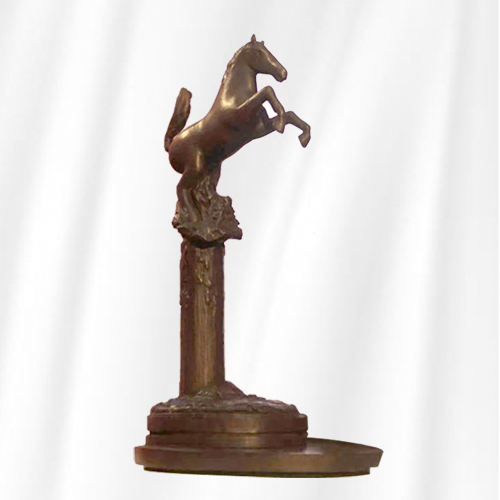
Westphalian Peace Prize
Every two years, the Economic Society awards the International Peace of Westphalia Prize, thereby recognizing special commitment to sustainable peace and international understanding. With 100,000 euros, the prize is the most highly endowed peace prize awarded by the business world. Historically, the prize is linked to the Peace of Westphalia, which was concluded in 1648 in the town halls of Münster and Osnabrück - a milestone in the history of European unification.We awarded the prize for the first time in 1998 on the occasion of the 350th anniversary of the Peace of Westphalia. The award ceremony will take place in the historic town hall in Münster. The award recognizes international personalities or representatives of states and institutions who, through their commitment, have a long-term peacemaking and integrative effect and have thus made a valuable contribution to peace in Europe and the world.
| Sl | Name | Country | Flag | Year | Awarded For |
|---|---|---|---|---|---|
| 23 | Emmanuel Macron | France | 2024 | significant contribution to peace restoration, reconcilliation and justice on the basis of courage, creativity and consistancy. | |
| 22 | German-Polish Youth Office | German | 2024 | significant contribution to peace restoration, reconcilliation and justice on the basis of courage, creativity and consistancy. | |
| 21 | Alexis Tsipras & Zoran Zaev | Greece, Macedonia | | 2020 | significant contribution to peace restoration, reconcilliation and justice on the basis of courage, creativity and consistancy. |
| 20 | Felix Finkbeiner & Plant-for-the-Planet | German | 2020 | significant contribution to peace restoration, reconcilliation and justice on the basis of courage, creativity and consistancy. | |
| 19 | Estonia, Latvia and Lithuania | Estonia, Latvia and Lithuania | 2018 | significant contribution to peace restoration, reconcilliation and justice on the basis of courage, creativity and consistancy. | |
| 18 | Rings of German Scouts and Guides | German | 2018 | significant contribution to peace restoration, reconcilliation and justice on the basis of courage, creativity and consistancy. | |
| 17 | H.M. King Abdullah II ibn Al Hussein | Jordan | 2016 | significant contribution to peace restoration, reconcilliation and justice on the basis of courage, creativity and consistancy. | |
| 16 | Action Reconciliation Service for Peace | German | 2016 | significant contribution to peace restoration, reconcilliation and justice on the basis of courage, creativity and consistancy. | |
| 15 | ISS Crews | 2014 | significant contribution to peace restoration, reconcilliation and justice on the basis of courage, creativity and consistancy. | ||
| 14 | Volksbund Deutsche Kriegsgräberfürsorge | German | 2014 | significant contribution to peace restoration, reconcilliation and justice on the basis of courage, creativity and consistancy. | |
| 13 | Helmut Schmidt | German | 2012 | significant contribution to peace restoration, reconcilliation and justice on the basis of courage, creativity and consistancy. | |
| 12 | Children for a Better World e.V. | German | 2012 | significant contribution to peace restoration, reconcilliation and justice on the basis of courage, creativity and consistancy. | |
| 11 | Daniel Barenboim | Argentina | 2010 | significant contribution to peace restoration, reconcilliation and justice on the basis of courage, creativity and consistancy. | |
| 10 | West-Eastern Divan Orchestra | Spain | 2010 | significant contribution to peace restoration, reconcilliation and justice on the basis of courage, creativity and consistancy. | |
| 9 | Kofi Annan | Ghana | 2008 | significant contribution to peace restoration, reconcilliation and justice on the basis of courage, creativity and consistancy. | |
| 8 | "Lebanon Project" (Young Malteser Community) | Malta | 2008 | significant contribution to peace restoration, reconcilliation and justice on the basis of courage, creativity and consistancy. | |
| 7 | Valéry Giscard d'Estaing | German | 2006 | significant contribution to peace restoration, reconcilliation and justice on the basis of courage, creativity and consistancy. | |
| 6 | Carla Del Ponte | Switzerland | 2002 | significant contribution to peace restoration, reconcilliation and justice on the basis of courage, creativity and consistancy. | |
| 5 | (Schüler Helfen Leben) Pupils Helping Life | German | 2002 | significant contribution to peace restoration, reconcilliation and justice on the basis of courage, creativity and consistancy. | |
| 4 | Helmut Kohl | German | 2000 | significant contribution to peace restoration, reconcilliation and justice on the basis of courage, creativity and consistancy. | |
| 3 | Polish Ekola High School and the Conrad von Soest High School | German | 2000 | significant contribution to peace restoration, reconcilliation and justice on the basis of courage, creativity and consistancy. | |
| 2 | Vaclav Havel | Czech | 1998 | significant contribution to peace restoration, reconcilliation and justice on the basis of courage, creativity and consistancy. | |
| 1 | Gesto por la Paz | Spain | 1998 | significant contribution to peace restoration, reconcilliation and justice on the basis of courage, creativity and consistancy. |

Westphalian Peace Prize Laureates (2030 ~ 2021)
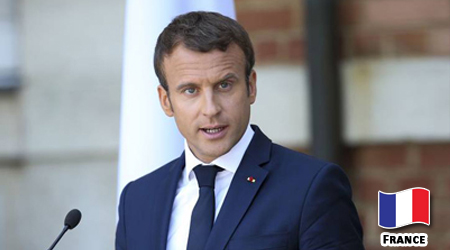
Emmanuel Macron
Westphalian Peace Prize 2024
Emmanuel Macron
Emmanuel Macron has been President of the French Republic since May 2017. He is tirelessly committed to a strong and united Europe and to promoting Franco-German friendship.Since the beginning of his presidency, Macron has continuously set new standards in European cooperation and thus strengthened peace on the continent. His diplomatic skill in maintaining dialogue with the Russian leadership despite serious upheavals is particularly noteworthy. In doing so, he acted in the spirit of the historic Peace of Westphalia of 1648, which laid the foundation for religious tolerance and international law.With his pro-European policy, President Macron is making a significant contribution to peace in Europe and is driving forward the European idea. The Peace Prize jury's statement stated: "Emmanuel Macron is a fighter for freedom, peace and Europe."With the award winner Macron, the Economic Society for Westphalia and Lippe has followed on from theaward ceremony in 2006, when former French President Valery Giscard d'Estaing was awarded the International Peace Prize for his commitment and fight for the European idea.
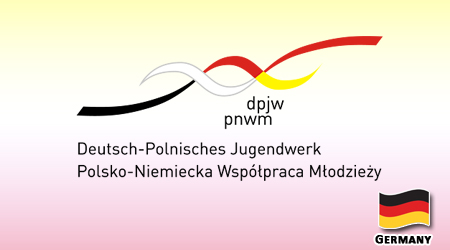
German-Polish Youth Office
Westphalian Peace Prize 2023
German-Polish Youth Office
The German-Polish Youth Office (DPJW) makes an outstanding effort to promote friendship and cooperation between young people from Germany and Poland and to convey European values. Since its founding in 1991, the DPJW has initiated countless projects that give young people from both countries the opportunity to get to know each other, overcome cultural differences and build mutual understanding.The DPJW's commitment during the Ukraine war is particularly noteworthy. The organization has expanded its activities to support Ukrainian young people and families who had to flee the war. With special programs and projects, the DPJW has made an important contribution to providing these young people with a safe space and facilitating their integration into the new communities. These efforts underline the DPJW's ability to respond flexibly in times of crisis and to provide humanitarian aid.The 2024 International Peace of Westphalia Prize also recognizes the DPJW's ongoing work, which contributes to stability and peace in Europe. The DPJW impressively shows how youth exchange and international cooperation can contribute to promoting peace and understanding.
View More

Westphalian Peace Prize Laureates (2020 ~ 2011)
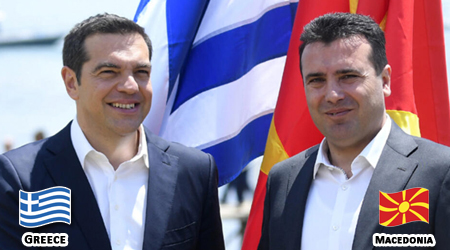
Alexis Tsipras & Zoran Zaev
Westphalian Peace Prize 2020
Alexis Tsipras and Zoran Zaev
The Prime Ministers of Greece and North Macedonia, Alexis Tsipras and Zoran Zaev, have achieved a feat of diplomacy by reaching an agreement in the decades-long conflict over the name Macedonia, thereby making a significant contribution to stability in the entire Balkan region.Macedonia changed its name to the Republic of North Macedonia on 12 February 2019. This settled a conflict between the neighbours that had been bitterly fought for over three decades and had previously prevented what is now North Macedonia from joining NATO and the European Union. The signing of the bilateral agreement between Greece and North Macedonia on the name issue ("Prespa Agreement") on 17 June 2018 now serves as the basis for rapprochement with the EU. Greece had not accepted the country name Macedonia, as a region in the north of its own country is also called Macedonia.The agreement was the subject of highly controversial and polarising discussions in both countries, but was then successfully concluded. The driving force behind the agreement was the respective prime ministers on both sides. The Macedonian Zoran Zaev and the Greek Alexis Tsipras achieved a diplomatic feat with the Prespa Agreement that could have a signalling effect for the entire Balkan region. They showed that even a problem that was considered unsolvable can be solved with the will to compromise and perseverance. In doing so, the two prime ministers made a significant contribution to calming the situation in the region.Both heads of government at the time, but especially the Greek one, subordinated their personal careers to political reason, regardless of whether they would remain in office. Without these two statesmen, there would have been no solution, the name dispute would not have ended in the long term and the neighbourly feud would have continued to destabilise the entire Balkan region.Alexis Tsipras, born in 1974, was Greek Prime Minister from 2015 to 2019. He is the leader of the SYRIZA party. His time in office as Prime Minister was largely characterised by the Greek sovereign debt crisis.Zoran Zaev, born in 1974 like Tsipras, was Prime Minister of North Macedonia from 31 May 2017 to 3 January 2020. Zaev resigned from office to allow for new elections. The parliamentary election was not held until July 2020 due to the coronavirus pandemic. Zaev was re-elected Prime Minister of North Macedonia on the night of 31 August. He has been Chairman of the Social Democratic League of Macedonia since 2013.
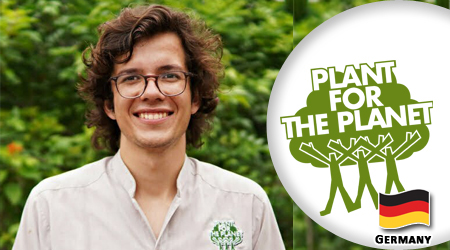
Felix Finkbeiner & Plant-for-the-Planet
Westphalian Peace Prize 2020
Felix Finkbeiner and the young "ambassadors for climate justice" from Plant-for-the-Planet
Plant-for-the-Planet is a children's and youth initiative that was co-founded in 2007 by Felix Finkbeiner, then a nine-year-old Bavarian schoolboy. A year earlier, a group of UN employees had launched the project, and Felix Finkbeiner and his father subsequently set up a foundation of the same name in Germany with the same aim: to raise awareness of climate change and global justice among children, young people and adults. The pupils actively combat climate change by planting trees. In this way, they make an exemplary and concrete contribution to the movements in favour of the world's climate goals.Plant-for-the-Planet has now become a global movement with more than 91,600 young "ambassadors for climate justice" - children and young people from a total of 75 countries. Every tree planted as part of the campaign symbolises climate justice. The movement's major goal is to plant one trillion - or 1,000 billion - new trees worldwide. This is intended to bind a significant proportion of the CO2 emissions caused by humans. Plant-for-the-Planet uses its internet platform to make its global renaturalisation efforts transparent. A total of 29 million trees have been donated via plant-for-the-planet.org since 2007. As part of the "Billion Tree Campaign", which UNEP, the United Nations Environment Programme, entrusted to the children of Plant-for-the-Planet in 2011, as many as 13.97 billion trees were reported worldwide between December 2006 and 2018.Plant-for-the-Planet offers training workshops, known as academies. Children between the ages of nine and twelve pass on their knowledge to others and train them to become "ambassadors for climate justice". More than 1600 Plant-for-the-Planet Academies have already taken place. On the Yucatán Peninsula in Mexico, the organisation is working to restore 20,000 hectares of destroyed forest. Plant-for-the-Planet put the issue of climate change on the agenda at an early stage back in 2007. The youth organisation's approach is to make an effective and constructive contribution to the global climate debate through practical action.
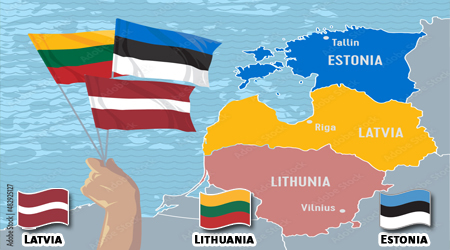
Estonia, Latvia and Lithuania
Westphalian Peace Prize 2018
The Baltic states of Estonia, Latvia and Lithuania
The three Baltic states of Lithuania, Latvia and Estonia have been members of both the European Union and NATO since 1 May 2004. They are committed to developing and consolidating their democracies in Europe. This brings back memories of the so-called "Baltic Chain", with which millions of citizens of Lithuania, Latvia and Estonia formed the longest human chain in history in 1989. They demonstrated in favour of independence, freedom and their path to democracy within the European Union.Almost 30 years later, the Baltic states are generally regarded as model European countries. Within a very short space of time, the population has succeeded in establishing functioning democracies that are firmly committed to the principles of the rule of law, universal human rights and a free market economy. Due to this exemplary development path of the three countries after regaining their independence, it makes sense to honour and strengthen them for their special efforts towards integration in Europe. For this reason, the three Baltic states were honoured with the 2018 International Peace of Westphalia Award.The issues of "peace" and "national security" have been of particular concern to the citizens of the three Baltic states since they regained their independence at the beginning of the 1990s. Due to their exposed location as northern "outposts" of the EU, Lithuania, Latvia and Estonia are not free from potential vulnerability today. Conflict scenarios once again appear to be within the realms of possibility. As the three countries, with a total population of "only" around six million people, would be militarily vulnerable in any case, permanent integration into the EU and NATO is at the centre of common foreign policy interests.2018, the year of the Peace Prize award, marks the 100th anniversary of the founding of the Estonian and Latvian states and the restoration of the Lithuanian state. Today, the three Baltic states are firmly integrated into the Western system of values and alliances. With their capitals Tallinn, Riga and Vilnius, they have become "visitor magnets" for many Europeans due to their cultural diversity and historical backgrounds. As members of the eurozone, the three countries have a high level of political and economic stability and have all demonstrated responsibility in successfully assuming the presidency of the EU Council since joining the European Union. Lithuania, Latvia and Estonia already occupy leading positions in the development of the European economy. Their advanced digitalisation in business, administration and education is considered exemplary in Europe.The heads of state of the three countries came to Münster to accept the Peace Prize: two female presidents and one male president. Kersti Kaljulaid has been President of Estonia since October 2016, Dalia Grybauskaite has been President of Lithuania since May 2009 and Raimonds Vejonis has been President of Latvia since July 2015.
View More
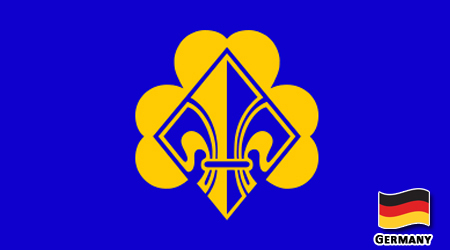
Rings of German Scouts and Guides
Westphalian Peace Prize 2018
Rings of German Scouts and Guides
As the world's largest youth movement, Scouting aims to contribute to the peace-oriented development of young people so that they can become involved in society as responsible citizens. The movement sees itself as international and independent of religion and politics. It is open to all. The most important principles are democracy, community and team spirit, living together as equals, tolerance towards others, respect for the environment and active commitment to the protection of nature. With these globally shared values, Scouting builds on the ideals of its founder, Lord Robert Baden-Powell, according to which all people - regardless of origin, skin colour, faith or property - can live together in peace. For this reason, the Scouts, represented by the Rings of German Scout Associations, are being honoured with the 2018 International Peace of Westphalia Award.Since its foundation in 1907, scouting has developed into the largest youth movement in the world with around 50 million members. The first scout camp was organised by Baden-Powell, a British general, on Brownsea Island in England. Initially, the focus was clearly on outdoor adventures in nature, but over the years, values such as solidarity, tolerance and international understanding became increasingly important in the various age groups. Today, the Scouts make a lasting contribution to peace through practising democracy and international encounters.Founder Lord Robert Baden-Powell once said: "A difficulty ceases to be a difficulty as soon as you smile about it and tackle it." The challenge for the Scouts to create peace in the world is therefore to work for it continuously and not to lose sight of the goal despite all obstacles. As an example of this, scouts have been distributing the Light of Peace from Bethlehem to "all people of good will" during Advent for over 20 years.In Germany, the Ringe deutscher Pfadfinderinnen- und Pfadfinderverbände (Rings of German Scout Associations) bundle the common interests of their member organisations with around 220,000 members. The "female" ring includes the Pfadfinderinnenschaft St. Georg (PSG), the Verband Christlicher Pfadfinderinnen und Pfadfinder (VCP) and the Bund der Pfadfinderinnen und Pfadfinder (BdP). The "male" ring includes the Deutsche Pfadfinderschaft Sankt Georg (DPSG), the VCP and the BdP. The German rings are embedded in the structures of the two world organisations - the World Association of Girl Guides and Girl Scouts and the World Organisation of the Scout Movement.
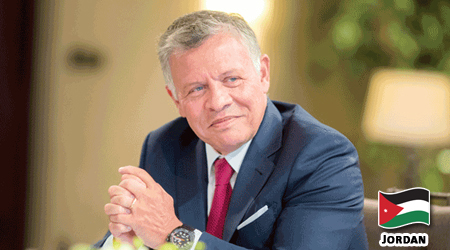
H.M. King Abdullah II ibn Al Hussein
Westphalian Peace Prize 2016
H.M. King Abdullah II ibn Al Hussein
H.M. King Abdullah II ibn Al Hussein has been King of Jordan since February 1999. Like his father, King Hussein ibn Talal, he is highly respected in both the Arab and Western world as a mediator in various conflicts. In the so-called Middle East conflict between Israel and the Palestinians, the Hashemite Kingdom of Jordan, in which many Palestinians live, has a central role to play when it comes to developing a just peace solution. King Abdullah is firmly of the opinion that security and peace in the Middle East region essentially require a mutual willingness to coexist and live together. King Abdullah fears that the existing armed conflicts in the Middle East could also affect Israel and Palestine and thus plunge the entire region into an unprecedented war if a mutually acceptable peace solution between Israel and the Palestinians is not found soon. In his book "The Last Chance - My Fight for Peace in the Middle East", King Abdullah also criticises efforts to call for further military action against Iran. For him, "a just and lasting peace is one of the strongest weapons against extremism".However, he also pleads for joint action - both Middle Eastern and Western - against the current religious fanaticism with which the so-called "Islamic State" is overrunning entire regions in Syria and Iraq and causing serious damage to the reputation of moderate and modern Islam. As a comparatively small state, the Hashemite Kingdom of Jordan is excelling in the reception and care of refugees. While it was first the Palestinians who sought refuge here after 1948 and 1967, hundreds of thousands came after the last Iraq war, and now over 1.5 million Syrians have been cared for since 2011. Jordan, which is one of the most water-scarce countries in the world, is therefore facing enormous challenges in the coming years. Mastering these challenges and securing Jordan's stability will require the support of all those who have an interest in bringing peace to the entire region.King Abdullah himself has a Western background: he was educated at Sandhurst Military Academy in the south of England, joined the British Army and studied international politics at Oxford and Georgetown University in Washington D.C. He then returned to Jordan as a professional officer. There he continued his military career, was promoted to commander in 1994 and finally to major general in 1998. In 1993, he married the Palestinian Rania Faisal Yasin, who had fled Kuwait during the Second Gulf War. Queen Rania is known for her worldwide commitment to peace, education and tolerance, among other things. She also embodies a modern image of women in a liberal and cosmopolitan Islam, which she is particularly committed to.King Abdullah is endeavouring to open up his country to foreign investors. This includes projects in the infrastructure and energy sector - for example wind farms, solar projects, water treatment and electricity generation. New laws ensure transparency and guarantee quality standards. In the course of the "Arab Spring", there were also demonstrations in Jordan, but these were comparatively peaceful and not directed against the person of the king. The royal family reacted quickly, showed understanding and reacted prudently to ease the situation: For example, wages in the public sector were increased. As part of so-called "reforms from above", a constitutional court was set up and a new electoral and party law was introduced.
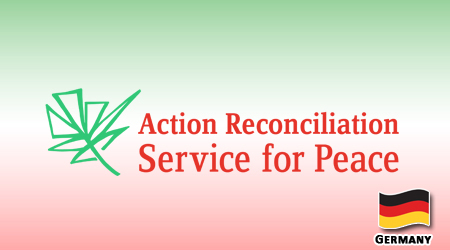
Action Reconciliation Service for Peace
Westphalian Peace Prize 2016
Action Reconciliation Service for Peace
Aktion Sühnezeichen Friedensdienste (ASF) is a German organisation of the peace movement. It was founded in 1958 at the synod of the Protestant Church in Germany with the significant involvement of Lothar Kreyssig. The ASF is particularly well known for its international volunteer programme and the organisation of work camps in Western and Eastern Europe.The ASF offers long-term, twelve to 15-month international peace service programmes for young men and women. The young volunteers accompany older people (for example in Jewish institutions and organisations for Shoah survivors) and support socially disadvantaged people (such as refugees and homeless people) as well as people with mental or physical disabilities. They are also involved in anti-racist initiatives or historical and political education projects.There are currently around 180 volunteers working in Belgium, Germany, France, the UK, Israel, the Netherlands, Norway, Poland, Russia, the Czech Republic, Ukraine, the USA and Belarus. The vast majority of volunteers come from Germany. Most participants are between 18 and 30 years old.The second important service offered by the ASF is the organisation of work camps. The aim is to encourage young Germans in particular to come to terms with National Socialism and its consequences through dialogue and direct encounters with people from a wide range of backgrounds.Three international meeting centres are closely linked to Aktion Sühnezeichen Friedensdienste: The International Youth Meeting Centre in Oswiecim/Auschwitz (Poland), Beit Ben Yehuda - House of Pax (Israel) and Foyer le Pont (France) regularly host events. Individual and group travellers are offered accommodation and educational opportunities there.For the organisation, dealing with National Socialism and its crimes is an obligation for concrete action in the present. In this way, the ASF aims to raise awareness of the consequences of history today and counter current forms of anti-Semitism, racism and the marginalisation of minorities.Well-known former ASF volunteers include the SPD politician Thomas Oppermann and the columnist Harald Martenstein. The organisation has been awarded the Buber-Rosenzweig Medal (1993), the Marion Samuel Prize (2001) and the Hans Ehrenberg Prize (2006), among others.
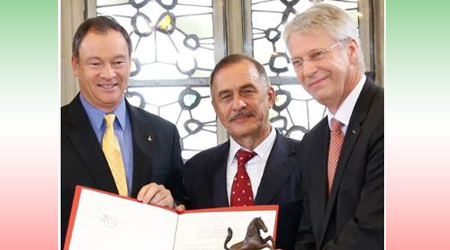
ISS Crews
Westphalian Peace Prize 2014
Crews of the International Space Station
Men and women who lived in hostile blocs during the Cold War now work and live together in a very confined space as a matter of course: 400 kilometres above the earth, in the International Space Station (ISS).The ISS is considered to be the largest technology project of all time and is a joint endeavour of the US American NASA, the Russian space agency Roskosmos, the European Space Agency ESA and the space agencies of Canada and Japan. The success of this "outpost of humanity" in space proves that peaceful international co-operation between partners from different cultures is possible.In 1993, Russia and the USA signed an agreement on ten shuttle flights to the Russian Mir space station and on long-term stays for a number of US astronauts. Under President Clinton, the project for a large space station was then relaunched together with Russia - Russia contributed the plans for the planned Mir-2 station.The ISS has been permanently manned since November 2000. The first twelve expeditions consisted exclusively of Russian and US space travellers. In July 2006, the German Thomas Reiter became the first ESA space traveller to be brought to the ISS for a long-term stay.In January 2013, US President Obama signed a law extending cooperation with Russia in space until 2020, ensuring that the formerly hostile superpowers will continue to work closely together as partners in the truest sense of the word.

Volksbund
Westphalian Peace Prize 2014
Volksbund Deutsche Kriegsgräberfürsorge – Youth work
The Volksbund Deutsche Kriegsgräberfürsorge e.V. preserves and cares for the graves of victims of war and tyranny abroad. The Volksbund is the only war graves service in the world to run its own youth work as well as its own youth meeting and educational centers.Although the Volksbund carries out war graves care on behalf of the federal government, it largely finances its work itself through the donations of its members and sponsors. Federal reimbursements only cover around 25 percent of the necessary funding.War gravesites are cemeteries under special legal protection, established for an indefinite period of time, which serve as an urgent reminder of peace to the living. They are places of individual mourning and collective remembrance, but also places for international encounters and learning about history.In the spirit of this conviction, thousands of young people from all over Europe come together every year at the Volksbund's work camps, youth meeting and educational centers. The facilities are located in Ysselsteyn (NL), in Lommel (B), in Niederbronn (F) and on the island of Usedom (D). As all the meeting places are located in the immediate vicinity of German war cemeteries, they offer participants a unique way of learning about history.The meetings of young Europeans help to develop mutual understanding and break down prejudices through encounters with the people of the host country. In this way, they make an active contribution to international understanding.The youth work groups offer opportunities for local participation. Together, the young people get involved in maintenance work at regional war gravesites, in discussion groups and discussions with contemporary witnesses, as well as at sporting events.The motto of the youth work sums up its uniqueness: "Reconciliation over the graves - working for peace".
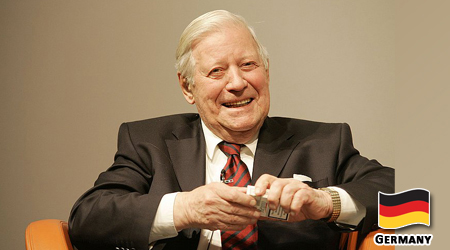
Helmut Schmidt
Westphalian Peace Prize 2012
Helmut Schmidt
Helmut Schmidt was Germany's fifth Chancellor from 1974 to 1982, having previously held the offices of Federal Minister of Defense and Federal Minister of Finance, among others. Today, at the age of 93, the "elder statesman" is considered one of the most popular and respected Germans, who is held in high regard both nationally and internationally.Schmidt was born in Hamburg in 1918. Influenced by his experiences as a soldier in the Second World War, he regarded the liberation of the Germans from National Socialism as a mission. He became involved in the Social Democratic Party as early as 1945. Schmidt gained popularity and a high reputation in 1962 as a young Senator of the Interior during the flood disaster in Hamburg. His time in office as Federal Chancellor was also marked by major challenges: the global economic recession and the oil crises in the 1970s and, in particular, the terror of the RAF.During the so-called "German Autumn", Schmidt made a name for himself as a courageous crisis manager. His consistent stance on the issue of rearmament and his commitment to the NATO Dual-Track Decision contributed to the end of the Cold War.Helmut Schmidt earned his merits above all as the architect of a peacefully united Europe. Together with French President Valéry Giscard d'Estaing - who was already honored with the Peace of Westphalia Prize in 2006 - he set the course for European integration. For example, the European Council was established shortly after he took office as Federal Chancellor. Together with Giscard d'Estaing, Schmidt also initiated the introduction of the European Monetary System and the European Currency Unit (ECU) in 1979, which later gave rise to the European Economic and Monetary Union and the euro. Together with Giscard d'Estaing, Schmidt also launched the World Economic Summit in 1975.Even decades after his retirement from active politics, Schmidt continues to make passionate pleas for Europe. "The common public good of the European nations must be the maxim of our own actions," he declared in 2011.
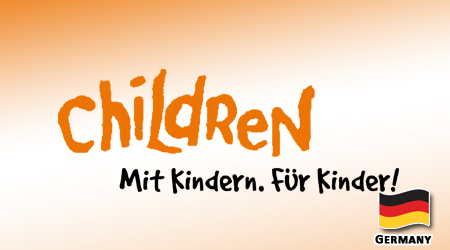
Children for a Better World e.V.
Westphalian Peace Prize 2012
Children for a better World e.V.
Children for a better World e.V. is an organization based in Munich that was founded in 1994 and supports children's aid projects worldwide. The guiding principle is: "With children. For children!" Since its foundation, particular emphasis has been placed on involving children directly in the work. Children's advisory boards, in which children and young people decide on the allocation of funding, are an integral part of the organization.The aim of Children for a better World e.V. is to help children and young people all over the world to improve their living conditions and overcome emergency situations. Through the work of the association, young people from Germany are encouraged to stand up for other children. The association was founded by around 30 personalities from the worlds of politics, culture and business. To date, more than 1,200 projects worldwide have been supported with 25 million euros in donations.The work covers various areas: To promote the involvement of young people in Germany, the "JUGEND HILFT!" project was launched in 1999. - a sponsorship competition that supports the social commitment of young people. The "Hunger in Germany" project was launched in 2004. It supports 50 child and youth work facilities in socially deprived areas, with a focus on financing lunches. Children for a better World e.V. provides one-off or regular financial support for children's aid projects worldwide. The projects abroad are supported on a voluntary basis by association members who collect donations and provide long-term support for the projects on site - in India, China, Vietnam and Guinea.

Westphalian Peace Prize Laureates (2010 ~ 1998)
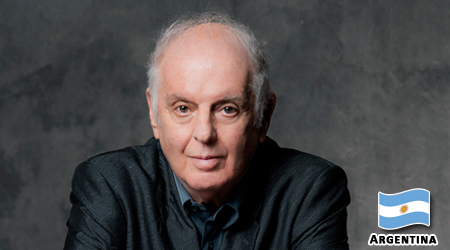
Daniel Barenboim
Westphalian Peace Prize 2010
Daniel Barenboim
Daniel Barenboim's life-long goal is to bring about rapprochement and reconciliation between Israelis and Palestinians and to work tirelessly for international understanding and dialog in the Middle East. The conductor and pianist relies less on the power of words at the podium and more on the power of music in collaboration with the West-Eastern Divan Orchestra, which he founded. A cultural initiative that is nevertheless highly political and supported by the vision of rapprochement and peaceful coexistence between hostile ethnic groups.Barenboim is a true cosmopolitan. He was born in Argentina on November 15, 1942 and holds Argentinian, Israeli and Spanish citizenship as well as a passport from the Palestinian Authority. He first came to public attention as a highly acclaimed pianist, but Barenboim achieved worldwide fame as a conductor. His performances and recordings have made a significant contribution to making classical music accessible to a broad public.Barenboim is a political artist who also uses his art to actively promote rapprochement and reconciliation between the populations of Israel and Palestine. In doing so, he also breaks various taboos: for example, he conducted the first Wagner concert to be performed on an Israeli stage after the war, which triggered a major debate among the Israeli public.Daniel Barenboim performed in Egypt for the first time on April 16, 2009. He conducted the Cairo Symphony Orchestra at the Cairo Opera House, with Ludwig van Beethoven's Symphony No. 5 on the program. His performance was highly controversial beforehand for political reasons. With these provocations, Barenboim wanted to show that music unites people across borders, religions and nations.Between February and April 2006, Barenboim also gave lectures at various locations (London, Chicago, Berlin, East Jerusalem and West Jerusalem) for the BBC series of "Reith Lectures", which were intended to show "that music is at the heart of what we call human".
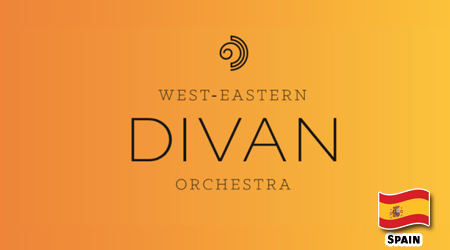
West-Eastern Divan Orchestra
Westphalian Peace Prize 2010
West-Eastern Divan Orchestra
The West-Eastern Divan Orchestra is an orchestra based in Seville made up of Arab and Jewish musicians from various Middle Eastern countries. Daniel Barenboim and the late literary scholar Edward Said founded the orchestra in 1999 and named it after an anthology of poems by Johann Wolfgang von Goethe.The aim of the West-Eastern Divan Orchestra is to promote understanding between Israelis and Palestinians. The musicians want to pave the way towards a peaceful and just solution to the Israeli-Palestinian conflict. One of the young artists described the extraordinary orchestra as follows: "Barenboim always says that this project is not political. But this orchestra is a political statement from both sides and that's great. The orchestra is a human laboratory that can show the whole world how to get along with each other."The first working meeting of the musicians took place in Weimar in August 1999. In 2000, the musicians met again in Weimar, in 2001 in Chicago and since 2002 in Seville in the Spanish autonomous region of Andalusia. Centuries ago, Jews, Muslims and Christians lived together peacefully and mutually enriched each other in the province of Granada. Summer tours regularly take the orchestra across several continents. In August 2005, a highly acclaimed concert took place in Ramallah, which was broadcast live on television in many countries.
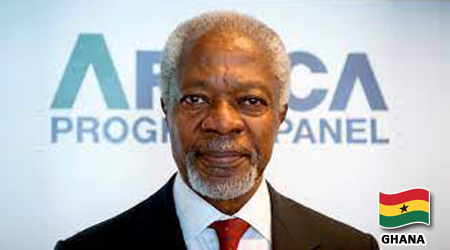
Kofi Annan
Westphalian Peace Prize 2008
Kofi Annan
According to the jury and board of trustees of the Economic Society for Westphalia and Lippe, former UN Secretary-General Kofi Annan has been awarded the Peace Prize because he has always remained true to his vision of a more peaceful world despite many political disappointments and personal disparagement in office. It was under Annan's General Secretariat that the World Climate Report was drawn up, which has since brought about a change in the world's awareness of the problem. According to the jury, Annan's high moral standing is currently also reflected in the fact that he is recognized by the parties as a credible mediator in the bloody conflict in Kenya.The Nobel Peace Prize laureate has repeatedly used compelling arguments to point out the connection between freedom, social progress, equality and respect for human dignity and has campaigned with all his might for peace and non-violence.The Ghanaian Annan was born on April 8, 1938, the third of five children in a merchant family. In 1959, the highly gifted student left his West African homeland to study economics in the USA. He is married for the second time to the Swedish lawyer Nane, a niece of the Swedish diplomat Raoul Wallenberg, who is one of Annan's role models. In 2001, Annan was awarded the Nobel Peace Prize.Kofi Annan has spent his entire professional life at the United Nations. However, the gentle man from Ghana did not become a bureaucrat, but a visionary with moral weight, who led the UN back onto the political world stage. When Kofi Annan was elected to the highest office of the United Nations in 1996, he took over an organization in a disastrous state: the UN was almost bankrupt, relations with the USA were shattered, peace missions around the world were a fiasco. More than half a million people were cruelly killed in Rwanda within a few weeks in 1994, while the world looked on "neutrally".Annan was responsible for peace missions as UN Deputy Secretary-General at the time and knew that the Hutu government was planning mass murders of the Tutsi minority. But he was unable to wrest a mandate to intervene from the UN Security Council. For him, it was the most serious personal defeat of his life, Annan said later. For the UN, it was a disaster.The world organization's reputation was ruined when Annan took office in December 1996, and it played practically no role on the world political stage. But in the years that followed, Annan managed to stabilize the organization's budget, resolve the dispute with the US Congress and make the UN a factor in international politics again.
View More
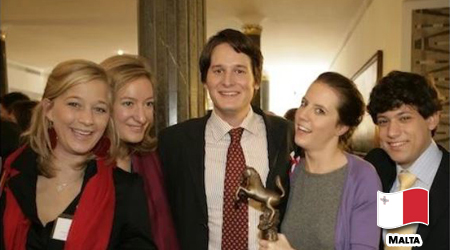
"Lebanon Project" (Young Malteser Community)
Westphalian Peace Prize 2008
"Lebanon Project" of the Young Malteser Community
An escape from everyday life characterized by the turmoil of war and deprivation - this is what the Young Maltesers have been making possible for disabled people in Lebanon since 1998. Every summer, they take around 150 guests of all ages to the only handicapped-accessible vacation home in the country. There, the disabled people receive attention that many of them have never experienced before. Their lives are characterized by homes where they receive the necessary food, care and accommodation, but hardly any therapy due to a lack of staff. Hospitalism, aggression and self-harming behavior are the consequences.Everyday life at the vacation camp is completely different: each guest is assigned a volunteer who is there just for them. Someone who shares their day with them, takes them seriously and offers them friendship. The volunteers organize their free time according to the individual preferences and abilities of the guests. Their motivation varies: they want to help the poor of the world without detours, experience the practical side of faith and get to know the Middle East better.Many of these wishes come true. But the camp does even more: for the first time in months, disabled children are able to relax and show their happiness. The professional helpers and volunteers get the feeling that they are needed. Many Lebanese are experiencing friendly interaction between disabled and non-disabled people for the first time and are gaining a new perspective on disability and infirmity. Finally, Malteser International's presence in the Middle East sends out a signal that goes far beyond the situation of the disabled: Lebanon lies at the heart of a region characterized by insecurity and war. But in the Malteser camps, young Lebanese people experience that change is possible - even under adverse circumstances.
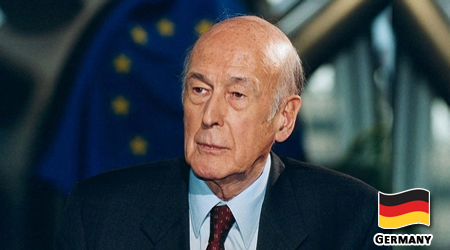
Valéry Giscard d'Estaing
Westphalian Peace Prize 2006
Valéry Giscard d'Estaing
The 2006 Peace of Westphalia Prize honors the former French President Valéry Giscard d'Estaing not only as a convinced and convincing builder of Europe, but above all for his work as Chairman of the Constitutional Convention of the European Union. In tough negotiations, he succeeded in drafting a constitutional treaty for a united Europe.The international jury of the Peace Prize voted for the prizewinner not despite, but precisely because the draft constitution failed in the referendums in France and Holland for predominantly domestic and party political reasons. "The treaty is anything but unsuitable; a constitutionally united Europe would be an additional guarantee for the internal and external peace of an entity of European states located between a confederation of states and a federal state under constitutional law," the jury's statement said.
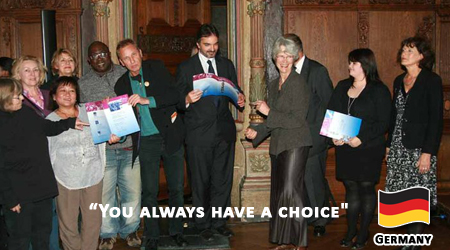
Young people in the von Bodelschwinghsche Anstalten Bethel
Westphalian Peace Prize 2006
Young people in the von Bodelschwinghsche Anstalten Bethel
The Youth Prize of the Year 2006 goes to the young people at the von Bodelschwinghsche Anstalten Bethel, who carry out their self-sacrificing work with old, sick and disabled people during a social year there. They are also honored on behalf of numerous other young people who volunteer to help in socially sensitive places.In Bethel, more than 150 young people now contribute their willingness to help to the largest diaconal institution in the world every year. They practise humanism and charity there and consolidate their own social skills, according to the jury's statement. Especially in 2006, a year in which many places are commemorating the 175th anniversary of Friedrich von Bodelschwingh's birth, the work carried out in Bethel seems particularly worthy of recognition.
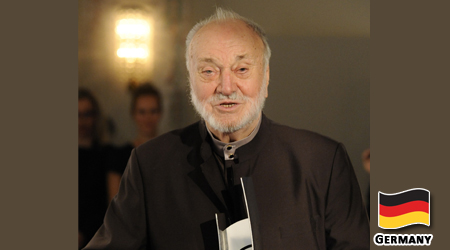
Kurt Masur
Westphalian Peace Prize 2004
Kurt Masur
Civil courage – for this, conductor Kurt Masur received the 2004 Peace of Westphalia Prize. Willy Brandt expressed the importance of this virtue in his “Memoirs”: “Where civil courage has no home, freedom does not reach far.” Kurt Masur has succeeded in confirming this quote in a special way: He was one of the six prominent Leipzig residents who prevented the Monday demonstration from escalating through their personal efforts in the autumn of 1989. The jury emphasised Kurt Masur’s key role in the events: “He called for peaceful dialogue and took away the regime’s pretext for the military intervention that had already been prepared. In this way he became the saviour of Leipzig and one of the fathers of the first revolution on German soil that did not shed a drop of blood.” Masur is actually a “politician against his will”, as he devoted himself to music from an early age. He was born on 18 July 1927 in Brieg, Silesia, and at the age of 15 he attended the State Music School in Breslau. After the war, he studied piano, composition and conducting in Leipzig. After several positions as a conductor, Masur became general music director at the Mecklenburg State Theater. In 1960, the director of the comic opera, Walter Felsenstein, hired him as chief conductor, and he later moved to the Dresden Philharmonic. His most important creative phase finally began in 1970, when Masur became conductor of the Gewandhaus in Leipzig. From this position, he demonstrated civil courage and personal commitment. "He used his reputation and made the voiceless sound of the heart heard," said the jury.
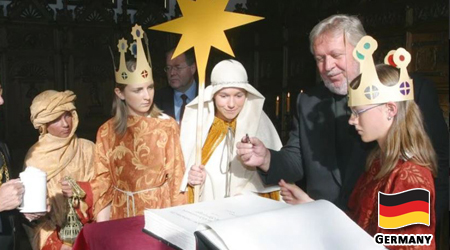
Sternsinger
Westphalian Peace Prize 2004
Star Singers
The 2004 Youth Prize goes to the Star Singers. Every year after Christmas, around 500,000 children and young people go from house to house to collect money for those in need all over the world. Millions of euros are raised within a few days, so that the sponsoring organizations - the Children's Mission Society and the Association of German Catholic Youth (BDKJ) - had around 32 million euros available for charitable purposes in 2003. The jury's statement stated: "Our world would be a lot darker if it weren't for the Star Singers, who collect help for a more peaceful world with shining children's eyes."
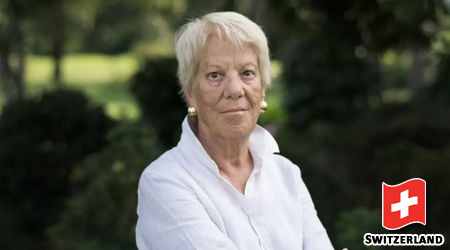
Carla Del Ponte
Westphalian Peace Prize 2002
Carla Del Ponte
The winner of the 2002 Peace of Westphalia Prize, Carla Del Ponte, was born in Lugano on February 9, 1947. She studied law in Great Britain and Switzerland, set up a law firm and notary's office in 1975, before moving to the Lugano Public Prosecutor's Office in 1981. In 1985, Ms Del Ponte became a public prosecutor. She became known beyond the borders of her home canton when she campaigned against economic crime, drugs and arms trafficking; she succeeded in breaking up a money laundering ring run by the Sicilian mafia.In 1993, the Swiss government appointed Carla Del Ponte as Federal Prosecutor, making her the country's top prosecutor. In August 1999, at the suggestion of Kofi Annan, she was appointed by the UN Security Council as the new Chief Prosecutor of the War Crimes Tribunal for the former Yugoslavia in The Hague. Carla Del Ponte attracted particular attention with the indictment against the former Serbian President Milosevic.For the first time in modern history, a war crimes tribunal of this kind and the independent office of the Chief Prosecutor have been set up by the vast majority of sovereign states, because peacekeeping is only possible on the basis of truth and justice and perpetrators must not go unpunished under the protection of national sovereignty. Violations of international humanitarian law should not go unpunished, but should be punished. Criminal guilt is related to specific individuals, refuting the theory of collective guilt.The current incumbent, Carla Del Ponte, is being honored not only as an institution and symbol against inhuman and criminal state arbitrariness, but also as a person of integrity and courage. Ms. Del Ponte's work against all internal and external resistance as chair of the independent prosecution body of the UN war crimes tribunal is a "gift of hope for peace for future generations." Even if terms such as "chief prosecutor" and "chair of the prosecution" on the one hand and "peace prize winner" on the other hand do not necessarily seem to be compatible at first glance, the nomination took into account the fact that Carla Del Ponte also sees herself as the "voice of the victims."
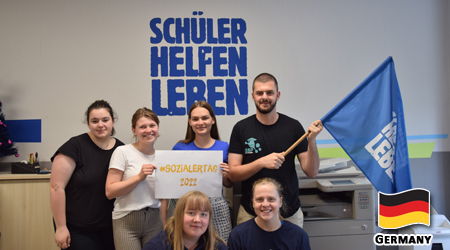
(Schüler Helfen Leben) Pupils Helping Life
Westphalian Peace Prize 2002
Students Help Life
The youth prize winner of the 2002 Peace of Westphalia Prize is the organization “Schüler Helfen Leben,” which has been contributing to peace and reconciliation with youth projects in the Balkans since 1992. The initiative began in Bad Kreuznach and was continued in Rhineland-Palatinate, then increasingly in Schleswig-Holstein, Lower Saxony and Hamburg.The first test of the relief work was supporting students in the refugee camps in Croatia. The German young people raised teaching and learning materials through their own collections and by giving up their own pocket money. In Sarajevo and Mostar they rebuilt or repaired schools and kindergartens under wartime conditions. In Sarajevo they built their own youth meeting center, which has become a meeting place for young Bosnians, Croats and Serbs. In Schleswig-Holstein alone, "Students Help Life" raised 767,000 euros in one day with 35,000 students.In the summer of 2000, 100,000 German students from Schleswig-Holstein, Rhineland-Palatinate and Hamburg collectively raised more than 2.15 million euros for peace work in the Balkans through voluntary work. This year, the campaign will also take place on June 18th under the motto "Work instead of lessons".
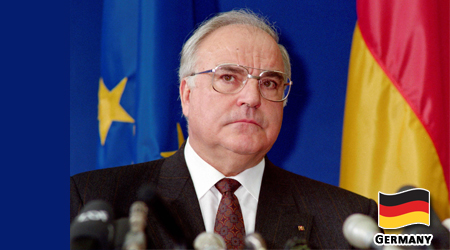
Helmut Kohl
Westphalian Peace Prize 2000
Helmut Kohl
Former German Chancellor Helmut Kohl was awarded the 2000 Peace of Westphalia Prize in Münster. The winner received the award in Münster City Hall from Dr. Horst Annecke, Chairman of the Economic Society for Westphalia and Lippe (WWL).The decision to award the Peace of Westphalia Prize to Helmut Kohl honors the former Chancellor's achievements in German reunification and in overcoming the division of Europe. Germany's position in Europe and the world is being consolidated and stands for a peaceful unification of European states as equal members of the European community of states.
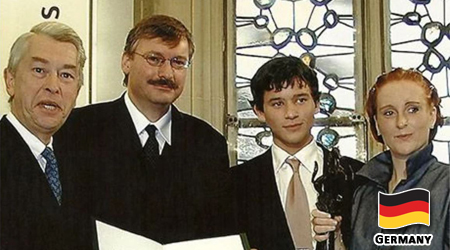
Polish Ekola High School & Conrad von Soest High School
Westphalian Peace Prize 2000
Ekola-Gymnasium and Conrad von Soest Gymnasium
In the youth award section in 2000, two high schools from Wroclaw and Soest/Westphalia, the Polish Ekola High School and the Conrad von Soest High School, were jointly awarded. The Ekola School of the Wroclaw Educational Society (Zespol Szkol Spolecznych nr 1 we Wroclasju), which was founded in 1990, fulfils its mission in accordance with fundamental values such as justice, honesty, tolerance, truth, maintaining peace, European understanding and environmental protection. International cooperation in the ecological field began with participation in the interdisciplinary nature conservation programme "Science Across Europe".Since 1992, the school has promoted the process of mutual understanding with German schools by having its students take part in competitions (e.g. on the topic of "Neighbours in Europe") or by holding similar competitions for students from their own voivodeship (administrative district), e.g. "Discovering Germany" (1997) for Polish students and "Discovering Poland" (1998 and 1999) with the participation of German and Czech students.Over the years, the Conrad von Soest Gymnasium has initiated various cross-border projects and plans and carried them out according to the principle of "learning together - acting together - making friends and growing together". Young people from Poland, Sweden, Hungary and the Netherlands took part in these projects. This network of partnerships cooperated in the implementation of the ecology project "The environment knows no borders", which reflects the shared concern for nature conservation, but at the same time created the conditions for history projects.
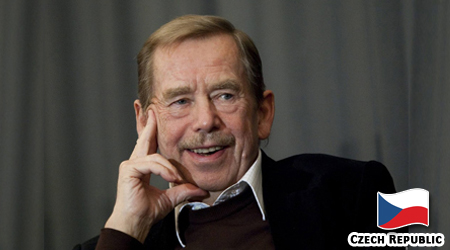
Vaclav Havel
Westphalian Peace Prize 1998
Václav Havel
Czech President Vaclav Havel was the first recipient of the Peace of Westphalia Prize in 1998 because he has distinguished himself beyond the borders of his own country as a leading figure in promoting understanding between the peoples and their citizens in Europe. With this commitment, he overcame historical and understandable resistance in his own country and achieved encouraging approaches in the German-Czech border regions.
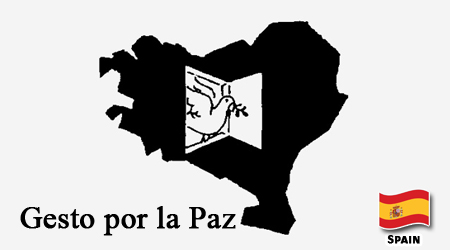
Gesto por la Paz
Westphalian Peace Prize 1998
Act for Peace
When awarding the youth prize, the jury chose "Gesto por la Paz" (Gesture for Peace), an association of various peace organizations in the Basque Country. "Gesto por la Paz" has become known for its silent marches and large demonstrations against the violence perpetrated in the Basque Country, particularly by ETA. One form of protest is an openly worn blue ribbon, which symbolizes solidarity with those kidnapped and their families. Both taking part in the demonstrations and wearing the blue ribbon requires a considerable amount of civil courage.Although the work of "Gesto por la Paz" has not been able to prevent the violent acts of Basque extremists, it has managed to ensure that protests against the violent acts in the Basque population have grown significantly in recent years. The organization is strongly influenced by young people. In 1998, the average age of the active members was 26 years old, and almost half of the twelve board members were younger than 25 at that time.


